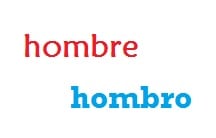The word paronomasia from the Greek language is the etymological origin of the term that we are now going to address. A word that was formed by the union of several elements. We are referring to the prefix «para-«, which means «next to»; the noun "onoma", which is synonymous with "word", and the suffix "-ia", which is used to indicate "quality".
This is the name given to the similarity that exists between those terms that are differentiated by a phonetic feature .
 It is important to mention that paronyms are words that maintain a similarity to each other due to their sound , their form or their etymology . Paronomasia, in this framework, can be considered as a resource based on the use of paronyms.
It is important to mention that paronyms are words that maintain a similarity to each other due to their sound , their form or their etymology . Paronomasia, in this framework, can be considered as a resource based on the use of paronyms.
It is about using words that have different meanings, although they sound similar . For example : man and shoulder , port and door , oenology and ethnology , sex and brain , etc.
In addition to all the above, we cannot ignore that there are two different types of paranomasia:
-Parequesis, which is the use of different words that share the same root or come from the same original word. An example of this would be using do and undo in the same sentence, for example.
-The polyptoton, which involves carrying out the conjugation of the same verb several times. Without a doubt, one of the popular proverbs or sayings that can be used to understand it is this: "How do you want me to love you if the one I want to love me doesn't love me the way I want him to love me?"
Paronyms should not be confused with homonyms . While paronyms have different meanings and are similar in phonetic characteristics, homonyms are spelled the same but have different meanings (such as "wine" in "He drank wine yesterday" and "John did not come yesterday" ). Nor should paronyms be mixed with homophones , which are pronounced the same although they are written differently and refer to different issues ( "I really like your house" / "I hate hunting" ). Paronomasia occurs between paronyms.
It is common for paronomasia to appear in word games . Let's look at a case: «Hurry! "That the prey does not know prose and, with surprise, it lands in the well in the floor." As you can see, there are several terms that sound similar, although their meanings have nothing to do with each other. It should be noted that paronomasia is usually used in satires, tongue twisters, riddles and other types of texts.
Examples of proverbs, famous phrases and tongue twisters that help to understand how paranomasia works or how paranomasia is commonly used are the following:
-The play on words: "I eat little, I buy little coconut."
-The famous Spanish writer Camilo José Cela has this one among his most recognized phrases, which he pronounced after during a ceremony a person said to him: «Sir, Cela. "He's falling asleep." He replied: “No, I am asleep. "As being screwed is not the same as being screwed."
-The tongue twister: "The hedgehog bristles, he bristles with laughter."
